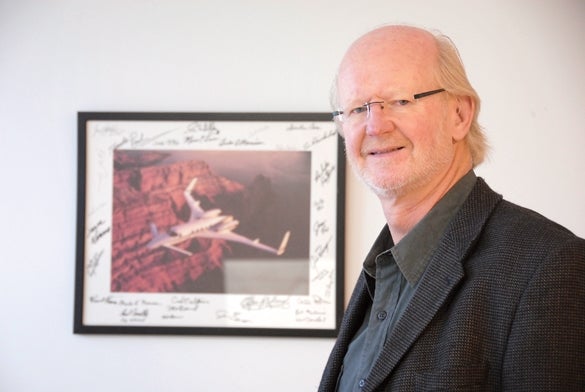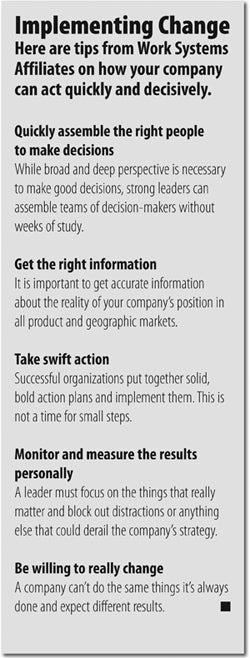Houston, We Have A Problem
Change is difficult. And for some of the biggest companies and government agencies in the country, it can seem almost impossible.
When this was the case for NASA, it wasn’t a high-profile consulting firm or some overbearing arm of the federal government that came to the rescue.
It was a small Auburn-based firm called Work Systems Affiliates International Inc. Earlier this year, NASA renewed its contract with WSA for a project to develop a strategic planning process for the Johnson Space Center in Houston.
So far, the space center seems to like WSA’s perspective that “strategy is about being different, about deliberately choosing a different set of activities” to achieve goals, Paul R. Plotczyk, president of WSA said.
In other words, companies can’t keep doing what they’ve always done and expect new and different results.
“If what you’re doing is going to get you where you want to go, don’t hire us,” Plotczyk said.
Ground Control
WSA’s mission is to help the Johnson Space Center develop a strategic plan that will allow the agency to maintain and enhance its role as the leader and coordinator of the international space flight community.
Steven Gonzalez, deputy of the advanced planning office at the space center, said they brought on WSA to help his department not only develop, but implement long-range strategy. The center — which employs 3,500 government workers — has plenty of long-ranging plans, but most have sat on shelves and haven’t been executed.
The challenge, according to Gonzalez, is that space center leadership is focused on the day-to-day of keeping astronauts safe while in space – a task that, of course, takes intense attention.
“Right now we have six astronauts in space from a half a dozen countries…and that creates an environment that’s focused on the present,” he said.
The Johnson Space Center’s name conjures images of young engineers with flat-top haircuts, short-sleeved white oxford shirts, skinny black ties and heavy-rimmed glasses smoking pipes as they guide manned missions to space. In many ways, the center hasn’t changed much since the Apollo days, mostly because it didn’t have to.
Those days are over, and NASA has realized that space exploration is once again likely to get highly competitive, said Plotczyk.
NASA’s competition isn’t just coming from other countries. On the horizon, the agency, which at the moment is without a director, can see private space travel companies vying for a piece of the galactic action.
And that’s why Gonzalez is excited about WSA’s help. One of the exercises WSA has recommended is for the center’s management to think like the competition.
Plotczyk said WSA is preparing to lay out steps for the space center that include close involvement of upper management and a promise to “cut through the bureaucracy” for younger employees.
“It’s about getting decisions made and getting things done,” he said. “NASA has a problem like many other government agencies because there’s no director. They’re asking, ‘What’s next for us?’ They’re looking for a strategic development and planning process. Their people operate in silos.”
And WSA’s help could break them out of those silos, and just as the organization is asking itself, “What are we going to work on? How are we going to work together?”
“It’s a new environment. They’ve got competition they’ve never had before,” Plotczyk said.
WSA has a history of working with government agencies from the EPA to the DOT and the Army and is on the schedule of approved government contractors.
“We have a fairly well-organized marketing effort, and we’ve targeted the government,” Plotczyk said.
The result is a small consulting firm that commands pretty large fees. Companies that might need the kind of help WSA provides should probably have revenues between $80 million and $3 billion, Plotczyk said.
But that doesn’t mean only large companies can benefit from WSA’s advice.
Plotczyk is the co-founder of the strategic consulting group at Linkage, an international training and consulting firm. He did management training exclusively until about 15 years ago when he began doing consulting and company turn-around work. WSA came out of Linkage, which still exists.
He said the lessons the Johnson Space Center and other large clients like Harley Davidson and Crate and Barrel have learned can also be applied to smaller businesses.
Many companies manage themselves well, but do not manage particular projects well. Others fail to realize that the “work environment” includes everyone who works at or for the company.
But how does a company get all its employees on board with working toward a single goal in a coordinated, integrated fashion? There will always be politics, groups within a company that have differing agendas.
Plotczyk said he’s spoken with chief executives, “and she or he has a different perspective than everybody else.” Any company’s strategic objective should be to get all of its people working primarily to accomplish the same job.
But how does a company get all its employees on board with working toward a single goal in a coordinated, integrated fashion? There will always be politics, groups within a company that have differening agendas.











0 Comments